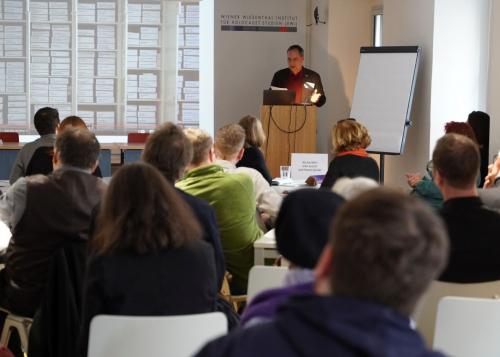EHRI and Micro-Archives in Austria

By Florine Miez, Vienna Wiesenthal Institute for Holocaust Studies (VWI)
The full-day workshop "EHRI and Micro-Archives in Austria" took place at the Vienna Wiesenthal Institute for Holocaust Studies on 4 March 2024. The Institute presented EHRI's plans to improve support for micro-archives and invited Austrian micro-archive owners and experts to discuss the opportunities and challenges of collaboration.In the keynote speech by Franziska Schubert (Arolsen Archives), the importance of EHRI and its projects for micro-archives was explained.
In the current project phase of EHRI-3, these archives are to be integrated into the infrastructure and made more visible. EHRI has set itself the goal of reaching out to more micro-archives so that they can also be listed in the EHRI Portal using a publication tool.
Austrian micro-archives
After the keynote, various Austrian micro-archives then presented their work. Robert Streibel talked about his collection for researching the Jewish community and National Socialism in Krems and Hietzing; Andreas Sarközi presented the Cultural Association of Austrian Roma (Kulturverein österreichischer Roma), which maintains a research and newspaper archive as well as a library. The Center for Queer History QWIEN with its holdings on queer history and its focus on the persecution of homosexual people under National Socialism was presented by Hannes Sulzenbacher. This was followed by a presentation by Michael Achenbach from RE.F.U.G.I.U.S., an association that has set the focus of commemorating the victims of Nazi rule in Rechnitz and compiles the collections of the association and the researchers. NS-Quellen was presented by Verena Pawlowsky. Here, for example, material on compensation issues and restitution was collected in the form of a database.
EHRI tools
In a roundtable discussion, Gerhard Baumgartner, Albert Lichtblau, and Harald Wendelin spoke aboutt heir research experiences in micro-archives. They discussed the issues of visibility of micro-archives preserved in the future. The EHRI tools were then presented, including the prototype of the Micro-Archive Publication Tool (MAPT), which can be used, when ready, as a digital tool for online publication with standardised categorisation and for the presentation of digitised material and metadata. The EHRI Portal, Document Blog and Online Editions were also introduced - both a form of increasing visibility for micro-archives and a possibility to develop an exchange with researchers and archivists.
Concern
Finally, possibilities and ideas for collaboration were discussed in a panel. The micro-archive representatives emphasised that MAPT is currently still too focused on digital collections. Many smaller archives simply do not have the human resources to create digital copies. Their concern is that the collections can be removed if the holdings are to be digitised. This would require low-threshold support from EHRI - as a kind of "service desk" to update the inventory descriptions and provide editorial support. The EHRI representatives want to take these important inputs to the next work package meeting, also with regard to recognition for micro-archives in the form of public relations work. The discussion showed that it is still very essential to highlight the issue of visibility for micro-archives.
Open access journal S.I.M.O.N.
To coincide with the micro-archives workshop, the newest Special Issue of the open access journal S:I.M.O.N. – Shoah: Intervention. Methods. Documentation, titled "Precarious Archives, Precarious Voices. Expanding Jewish Narratives from the Margins" was presented. This issue was produced as a follow-up to a workshop on "Precarious Archives, Precarious Voices", discussing previously hidden documents and narratives on Jewish history and the Shoah that were collected in private collections, rediscovered archives and long unknown holdings in recent years. The individual contributions in the volume deal, among other things, with methodological approaches to micro-archives or personal approaches to archives from one's own family.
Images courtesy of VWI
